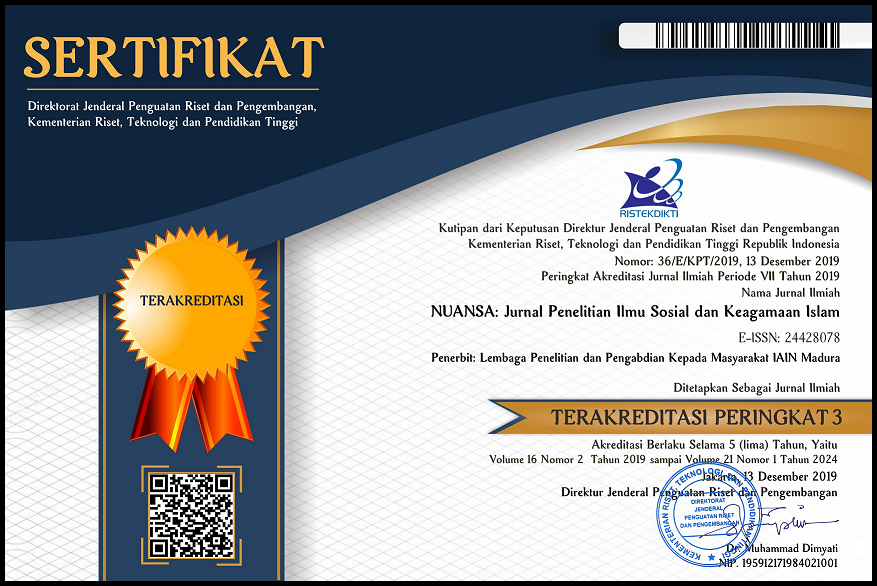Estô dalam Masyarakat Madura: Peran Kiai dan Blater dalam Mempertahankan Solidaritas Sosial di Era Modern
 Abstract views: 1
,
Abstract views: 1
,
 PDF downloads: 8
PDF downloads: 8
Abstract
Estô is a deeply rooted social tradition in Madurese society, reflecting values of selfless devotion, respect, and solidarity between individuals. This study aims to examine how the practice of estô is applied in Madurese society, particularly in relation to Kiai and the Blater community, and how it contributes to strengthening social bonds and maintaining harmony in the face of modernization challenges. The research employed a qualitative approach, using in-depth interviews and participatory observation in several villages on Madura Island. The findings show that while the practice of estô remains relevant, factors such as individualism, the influence of technology, and social change have impacted its execution. The community tends to prefer more practical forms of assistance, such as digital money transfers, over direct involvement in social activities. However, the core values of estô-solidarity, devotion, and mutual respect-remain intact despite changes in its form. This study concludes that although the methods of implementing estô have evolved, the essence and fundamental principles of the practice remain relevant and adaptable to modern times, preserving social solidarity in Madurese society. The preservation and strengthening of estô’s values are crucial for maintaining cultural identity and fostering harmonious social relationships in the future.
Downloads
References
Afidah, I. (2021). Spiritualitas masyarakat perkotaan. HIKMAH: Jurnal Dakwah & Sosial, 1(1).
Arif, A. M. (2020). Perspektif Teori Sosial Emile Durkheim Dalam Sosiologi Pendidikan. Moderasi: Jurnal Studi Ilmu Pengetahuan Sosial, 1(2), 1–14.
Bimantoro, M. S. (2024). Dampak perubahan nilai-nilai hukum dalam masyarakat tradisional dan modern. Journal Publicuho, 7(3), 1419–1426.
Boestam, A. B., & Des Derivanti, A. (2022). Komunikasi digital dan perubahan sosial. Jisip (Jurnal Ilmu Sosial Dan Pendidikan), 6(4).
Brata, I. B. (2016). Kearifan budaya lokal perekat identitas bangsa. Jurnal Bakti Saraswati (JBS), 5(1).
Hairunisya, N., & Subiyantoro, H. (2017). Developing a Partnership Program through Training And Mentoring the Fishermen. Research Report, 332–342.
Hefni, M. (2007). BHUPPA’-BHÂBHU’-GHURU-RATO (Studi Konstruktivisme-Strukturalis tentang Hierarkhi Kepatuhan dalam Budaya Masyarakat Madura). KARSA: Journal Of Social and Islamic Culture, XI(1).
Henderi, H., Mustofa, K. I., Lutfiani, N., & Savitri, A. N. (2024). Kemajuan Ekonomi Digital dan Perannya dalam Membentuk Dinamika Perdagangan Internasional Modern. ADI Bisnis Digital Interdisiplin Jurnal, 5(2), 17–24.
Heni, L., Sri, N., & Nada, Z. Q. (2024). Makna dan Praktik Estô dalam Komunitas Blater Madura (A. Muhlis (ed.); 1st ed., Vol. 7, Issue 2). Madza Media.
Jannah, H. (2019). Pondok Pesantren Sebagai Pusat Otoritas Ulama Madura. Jurnal Al-Hikmah, 17(1), 91–108. https://doi.org/10.35719/alhikmah.v17i1.9
Jazilah, J., & Safitri, R. M. R. M. (2024). From Togetherness to Individualism: The Evolving Meaning of Ngabuburit Among Teenagers. JISPO Jurnal Ilmu Sosial Dan Ilmu Politik, 14(1), 77–98.
Khozin, N. (2021). Pendidikan nasionalisme dan prinsip hubbul wathan minal iman di Pondok Pesantren Lirboyo Mojoroto Kota Kediri Jawa Timur. Institut Agama Islam Tribakti.
Kosim, M. (2012). Kyai and blater (local elite in madurese society). Karsa: Jurnal Sosial Dan Budaya Keislaman, 12(2), 150–160.
Mulyadi, M. (2015). Perubahan sosial masyarakat agraris ke masyarakat industri dalam pembangunan masyarakat di Kecamatan Tamalate Kota Makassar. Jurnal Bina Praja, 7(4), 311–322.
Nafis, M. M., & Najib, M. A. (2017). Pemikiran Sufistik dan Toleransi Beragama KH. Sholeh Bahruddin di Pesantren Ngalah Pasuruan. TEOSOFI: Jurnal Tasawuf Dan Pemikiran Islam, 7(2), 330–352.
Nugroho, C., Sos, S., & Kom, M. I. (2020). Cyber Society: Teknologi, Media Baru, dan Disrupsi Informasi. Prenada Media.
Pribadi, Y. (2014). Religious networks in Madura pesantren, Nahdlatul Ulama and Kiai as the core of santri culture. Al-Jami’ah, 51(1), 1–32. https://doi.org/10.14421/ajis.2013.511.1-32
Rozaki, A. (2009). Social origin dan Politik Kuasa Blater di Madura. Kyoto Review of Southeast Asia, 12.
Sri, N., Heni, L., & Zilfania Qathrun, N. (2024). Protangen: Etika Balas Budi Masyarakat Madura. Madza Media.
Syamsuddin, M. (2015). Elit Lokal Madura: Sisi Kehidupan Kaum Blater. Jurnal Lektur Keagamaan, 13(1), 157–182.
Syarif, Z. (2016). Pergeseran perilaku politik Kiai dan santri di Pamekasan Madura. Al-Tahrir: Jurnal Pemikiran Islam, 16(2), 293–311.
Tutut, P., Hartono, & Robert Budi, L. (2024). Makna Estetis dan Filosofis dalam Lirik Lagu “UM Berkarya” Karya Mu’arifin. Journal Global Education, Arts, Design & Performance (GLEADPER), 1(1), 15–24.
Copyright (c) 2024 NUANSA: Jurnal Penelitian Ilmu Sosial dan Keagamaan Islam

This work is licensed under a Creative Commons Attribution-NonCommercial 4.0 International License.
The journal operates an Open Access policy under a Creative Commons Attribution-NonCommercial 4.0 International License (CC-BY-NC) 
Authors who publish with this journal agree to the following terms:
- Authors retain copyright and grant the journal right of first publication with the work simultaneously licensed under a Creative Commons Attribution License that allows others to share the work with an acknowledgement of the work's authorship and initial publication in this journal.
- Authors are able to enter into separate, additional contractual arrangements for the non-exclusive distribution of the journal's published version of the work (e.g., post it to an institutional repository or publish it in a book), with an acknowledgement of its initial publication in this journal.
- Authors are permitted and encouraged to post their work online (e.g., in institutional repositories or on their website) prior to and during the submission process, as it can lead to productive exchanges, as well as earlier and greater citation of published work.





















